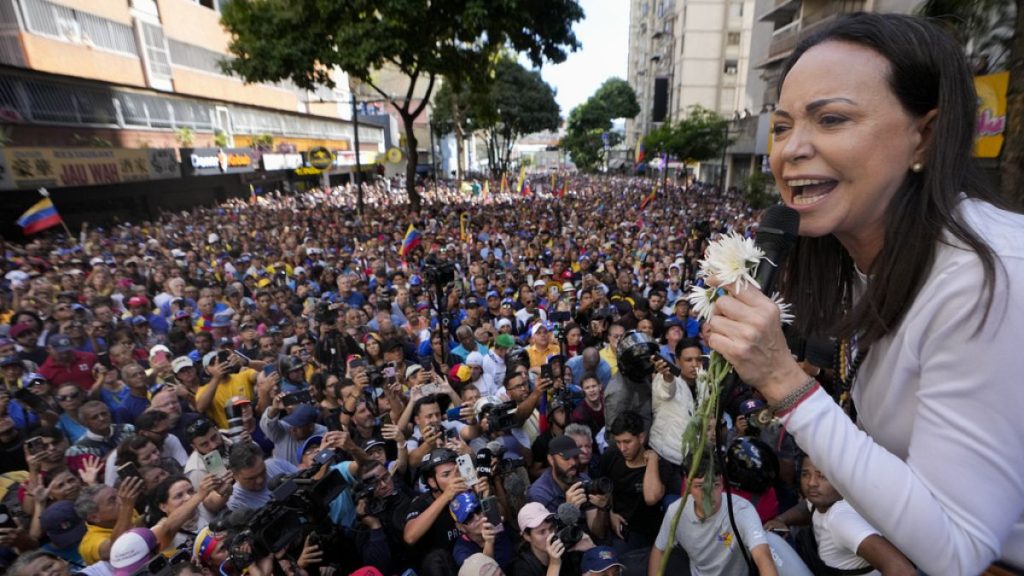The political landscape in Venezuela reached a boiling point on Thursday as opposition leader Maria Corina Machado dramatically reemerged from months of hiding to participate in anti-government protests aimed at preventing President Nicolás Maduro from solidifying his hold on power. This high-stakes maneuver coincided with global demonstrations in support of another opposition figure, Edmundo González Urrutia, who claimed victory in the July 28th elections and announced his imminent return to Caracas to assume the presidency. Machado’s reappearance injected renewed energy into the opposition movement, but quickly resulted in her arrest after security forces intercepted her convoy as it departed a protest in eastern Caracas. The incident, which reportedly involved gunfire aimed at the motorcycle convoy, underscores the volatile climate and the government’s swift crackdown on dissent. Machado’s whereabouts remained unknown immediately following the arrest, and the Maduro government offered no immediate comment, further heightening the tension and uncertainty surrounding the unfolding political drama.
The backdrop to Machado’s arrest was the escalating political standoff between Maduro and the opposition, which reached a critical juncture with González’s declaration and planned return to Venezuela. González’s assertion of electoral victory, based on copies of ballot papers he presented as evidence, directly challenged Maduro’s legitimacy and fueled the already simmering discontent among opposition supporters. Simultaneous protests erupting in major cities worldwide, including New York, Madrid, Buenos Aires, and Brussels, amplified the international pressure on Maduro and signaled a growing global concern over the Venezuelan political crisis. This coordinated display of support for González served to bolster his claim and put further pressure on the Maduro regime, setting the stage for a potentially explosive confrontation.
The streets of Caracas became a battleground of opposing ideologies as pro- and anti-government demonstrators clashed, reflecting the deep divisions within Venezuelan society. The convergence of these protests, spurred by both Machado’s call to action and Maduro’s impending inauguration, created a highly charged atmosphere. Machado, draped in the Venezuelan flag, rallied her supporters against Maduro while simultaneously endorsing González’s claim to the presidency. This public display of defiance and the endorsement of a rival leader further solidified Machado’s position as a key figure in the opposition movement and underscored the growing momentum behind González’s challenge. The scene in Caracas encapsulates the escalating polarization and the potential for further unrest as the two sides vie for control.
Meanwhile, from the National Palace in the Dominican Republic, González sought to project an image of hope and imminent change, promising a swift return to a “free” Caracas. This strategic message, delivered from outside Venezuela, aimed to galvanize support and maintain momentum in the face of Maduro’s continued grip on power. González’s pronouncements, coupled with the international protests, served to further delegitimize Maduro’s authority and cast doubt on his claim to the presidency. The timing of this message, coinciding with Machado’s reappearance and the global demonstrations, created a powerful narrative of impending change and heightened the pressure on the Maduro regime.
Nicolás Maduro, facing international scrutiny and accusations of electoral irregularities, prepared for his third consecutive inauguration, an event viewed by the opposition and many international observers as a consolidation of undemocratic rule. The absence of official election results further fueled skepticism and accusations of fraud, deepening the political divide. This defiant act of assuming power despite widespread contestation sets the stage for further conflict and raises concerns about the future of democracy in Venezuela. The international community watched closely, poised to react to the unfolding events, adding another layer of complexity to the already volatile situation.
The confluence of these events – Machado’s dramatic return and arrest, González’s declaration and planned return, the global protests, and Maduro’s controversial inauguration – created a critical juncture in Venezuela’s political trajectory. The day’s events underscored the deep political divisions within the country and the potential for further escalation. The international community remained on high alert, recognizing the gravity of the situation and the potential for widespread instability. The escalating tensions and the uncertainty surrounding the outcome created a precarious situation with far-reaching implications for the future of Venezuela.














